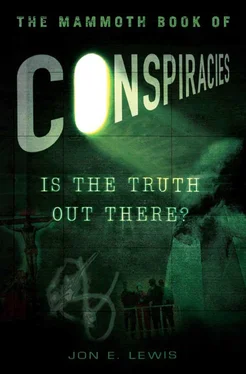Jon Lewis - The Mammoth Book of Conspiracies
Здесь есть возможность читать онлайн «Jon Lewis - The Mammoth Book of Conspiracies» весь текст электронной книги совершенно бесплатно (целиком полную версию без сокращений). В некоторых случаях можно слушать аудио, скачать через торрент в формате fb2 и присутствует краткое содержание. Город: London, Год выпуска: 2012, ISBN: 2012, Издательство: Robinson, Жанр: Прочая документальная литература, на английском языке. Описание произведения, (предисловие) а так же отзывы посетителей доступны на портале библиотеки ЛибКат.
- Название:The Mammoth Book of Conspiracies
- Автор:
- Издательство:Robinson
- Жанр:
- Год:2012
- Город:London
- ISBN:978-1-84901-363-5
- Рейтинг книги:3 / 5. Голосов: 1
-
Избранное:Добавить в избранное
- Отзывы:
-
Ваша оценка:
- 60
- 1
- 2
- 3
- 4
- 5
The Mammoth Book of Conspiracies: краткое содержание, описание и аннотация
Предлагаем к чтению аннотацию, описание, краткое содержание или предисловие (зависит от того, что написал сам автор книги «The Mammoth Book of Conspiracies»). Если вы не нашли необходимую информацию о книге — напишите в комментариях, мы постараемся отыскать её.
Jon E. Lewis is a historian and writer, whose books on history and military history are sold worldwide. He is also the editor of many
anthologies, including the best-selling
.
The Mammoth Book of Conspiracies — читать онлайн бесплатно полную книгу (весь текст) целиком
Ниже представлен текст книги, разбитый по страницам. Система сохранения места последней прочитанной страницы, позволяет с удобством читать онлайн бесплатно книгу «The Mammoth Book of Conspiracies», без необходимости каждый раз заново искать на чём Вы остановились. Поставьте закладку, и сможете в любой момент перейти на страницу, на которой закончили чтение.
Интервал:
Закладка:
If, then, it is said that the Revolution was prepared in the lodges of Freemasons—and many French Masons have boasted of the fact—let it always be added that it was “Illuminized Freemasonry” that made the Revolution, and that the Masons who acclaim it are illuminized Masons, inheritors of the same tradition introduced into the lodges of France in 1787 by the disciples of Weishaupt, “patriarch of the Jacobins”.
Many of the Freemasons of France in 1787 were thus not conscious allies of the Illuminati. According to Cadet de Gassicourt, there were in all the lodges only twenty-seven real initiates; the rest were largely dupes who knew little or nothing of the source whence the fresh influence among them derived. The amazing feature of the whole situation is that the most enthusiastic supporters of the movement were men belonging to the upper classes and even to the royal families of Europe. A contemporary relates that no less than thirty princes -reigning and non-reigning—had taken under their protection a confederation from which they stood to lose everything and had become so imbued by its principles that they were inaccessible to reason. Intoxicated by the flattery lavished on them by the priests of Illuminism, they adopted a religion of which they understood nothing. Weishaupt, of course, had taken care that none of these royal dupes should be initiated into the real aims of the Order, and at first adhered to the original plan of excluding them altogether; but the value of their cooperation soon became apparent and by a supreme irony it was with a Grand Duke that he himself took refuge.
But if the great majority of princes and nobles were stricken with blindness at this crisis, a few far-seeing spirits recognized the danger and warned the world of the impending disaster. In 1787 Cardinal Caprara, Apostolic Nuncio at Vienna, addressed a confidential memoir to the Pope, in which he pointed out that the activities carried on in Germany by the different sects of Illuminés, of Perfectibilists, of Freemasons, etc., were increasing:
The danger is approaching, for from all these senseless dreams of Illuminism, of Swedenborgianism, or of Freemasonry a frightful reality will emerge. Visionaries have their time; the revolution they forebode will have its time also.
A more amazing prophecy, however, was the “Essai sur la Secte des Illuminés”, by the Marquis de Luchet, a Liberal noble who played some part in the revolutionary movement, yet who nevertheless realized the dangers of Illuminism. Thus, as early as 1789, before the Revolution had really developed, de Luchet uttered these words of warning:
Deluded people… learn that there exists a conspiracy in favour of despotism against liberty, of incapacity against talent, of vice against virtue, of ignorance against enlightenment… This society aims at governing the world… Its object is universal domination. This plan may seem extraordinary, incredible—yes, but not chimerical… no such calamity has ever yet afflicted the world.
De Luchet then goes on to foretell precisely the events that were to take place three and four years later; he describes the position of a king who has to recognize masters above himself and to authorize their “abominable régime”, to become the plaything of an ambitious and fanatical horde which has taken possession of his will.
See him condemned to serve the passions of all that surround him… to raise degraded men to power, to prostitute his judgement by choices that dishonour his prudence…
All this was exactly fulfilled during the reign of the Girondin ministry of 1792. The campaign of destruction carried out in the summer of 1793 is thus foretold:
We do not mean to say that the country where the Illuminés reign will cease to exist, but it will fall into such a degree of humiliation that it will no longer count in politics, that the population will diminish, that the inhabitants who resist the inclination to pass into a foreign land will no longer enjoy the happiness of consideration, nor the charms of society, nor the gifts of commerce.
And de Luchet ends with this despairing appeal to the powers of Europe:
Masters of the world, cast your eyes on a desolated multitude, listen to their cries, their tears, their hopes. A mother asks you to restore her son, a wife her husband, your cities for the fine arts that have fled from them, the country for citizens, the fields for cultivators, religion for forms of worship, and Nature for beings of which she is worthy.
Five years after these words were written the countryside of France was desolate, art and commerce were destroyed, and women following the tumbril that carried Fouquier-Tinville to the guillotine cried out: “Give me back my brother, my son, my husband!” So was this amazing prophecy fulfilled. Yet not one word has history to say on the subject! The warning of de Luchet has fallen on deaf ears amongst posterity as amongst the men of his own day.
De Luchet himself recognizes the obstacle to his obtaining a hearing: there are too many “passions interested in supporting the system of the Illuminés”, too many deluded rulers imagining themselves enlightened ready to precipitate their people into the abyss, whilst “the heads of the Order will never relinquish the authority they have acquired nor the treasure at their disposal.” In vain de Luchet appeals to the Freemasons to save their Order from the invading sect. “Would it not be possible,” he asks, “to direct the Freemasons themselves against the Illuminés by showing them that whilst they are working to maintain harmony in society, those others are everywhere sowing seeds of discord” and preparing the ultimate destruction of their Order? So far it is not too late; if only men will believe in the danger it may be averted: “from the moment they are convinced, the necessary blow is dealt to the sect.” Otherwise de Luchet prophesies “a series of calamities of which the end is lost in the darkness of time,… a subterranean fire smouldering eternally and breaking forth periodically in violent and devastating explosions.” What words could better describe the history of the last 150 years?
The “Essai sur la Secte des Illuminés” is one of the most extraordinary documents of history and at the same time one of the most mysterious. Why it should have been written by the Marquis de Luchet, who is said to have collaborated with Mirabeau in the “Galerie de Portraits” published in the following year, why it should have been appended to Mirabeau’s “Histoire Secrète de la Cour de Berlin”, and accordingly attributed to Mirabeau himself, why Barruel should have denounced it as dust thrown in the eyes of the public, although it entirely corroborated his own point of view, are questions to which I can find no reply. That it was written seriously and in all good faith it is impossible to doubt; whilst the fact that it appeared before, instead of after, the events described, renders it even more valuable evidence of the reality of the conspiracy than Barruel’s own admirable work. What Barruel saw, de Luchet foresaw with equal clearness. As to the rôle of Mirabeau at this crisis, we can only hazard an explanation on the score of his habitual inconsistency. At one moment he was seeking interviews with the King’s ministers in order to warn them of the coming danger, at the next he was energetically stirring up insurrection. It is therefore not impossible that he may have encouraged de Luchet’s exposure of the conspiracy, although meanwhile he himself had entered into the scheme of destruction. Indeed, according to a pamphlet published in 1791 entitled “Mystères de la Conspiration”, the whole plan of revolution was found amongst his papers. The editor of this “brochure” explains that the document here made public, called “Croquis ou Projet de Révolution de Monsieur de Mirabeau”, was seized at the house of Madame Lejai, the wife of Mirabeau’s publisher, on October 6, 1789. Beginning with a diatribe against the French monarchy, the document goes on to say that “in order to triumph over this hydra-headed monster these are my ideas”:
Читать дальшеИнтервал:
Закладка:
Похожие книги на «The Mammoth Book of Conspiracies»
Представляем Вашему вниманию похожие книги на «The Mammoth Book of Conspiracies» списком для выбора. Мы отобрали схожую по названию и смыслу литературу в надежде предоставить читателям больше вариантов отыскать новые, интересные, ещё непрочитанные произведения.
Обсуждение, отзывы о книге «The Mammoth Book of Conspiracies» и просто собственные мнения читателей. Оставьте ваши комментарии, напишите, что Вы думаете о произведении, его смысле или главных героях. Укажите что конкретно понравилось, а что нет, и почему Вы так считаете.











